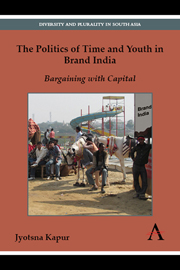Book contents
- Frontmatter
- Dedication
- Contents
- Acknowledgments
- Introduction: After Me the Flood
- Chapter 1 Brand India's Biggest Sale: The Cultural Politics and Political Economy of India's “Global Generation”
- Chapter 2 Arrested Development and the Making of a Neoliberal State
- Chapter 3 For Some Dreams a Lifetime is Not Enough: The Rasa Aesthetic and the Everyday in Neoliberalism
- Chapter 4 An “Arranged Love” Marriage: India's Neoliberal Turn and the Bollywood Wedding Culture Industry
- Chapter 5 Ek Haseenah Thi (There Once Was a Maiden): The Vanishing Middle Class and Other Neoliberal Thrills
- Conclusion
- Notes
- References
- Index
Chapter 2 - Arrested Development and the Making of a Neoliberal State
Published online by Cambridge University Press: 05 March 2014
- Frontmatter
- Dedication
- Contents
- Acknowledgments
- Introduction: After Me the Flood
- Chapter 1 Brand India's Biggest Sale: The Cultural Politics and Political Economy of India's “Global Generation”
- Chapter 2 Arrested Development and the Making of a Neoliberal State
- Chapter 3 For Some Dreams a Lifetime is Not Enough: The Rasa Aesthetic and the Everyday in Neoliberalism
- Chapter 4 An “Arranged Love” Marriage: India's Neoliberal Turn and the Bollywood Wedding Culture Industry
- Chapter 5 Ek Haseenah Thi (There Once Was a Maiden): The Vanishing Middle Class and Other Neoliberal Thrills
- Conclusion
- Notes
- References
- Index
Summary
In Shishu (Children), a short story by Mahasweta Devi ([1978] 1993), a junior government officer, Singh, is sent to distribute relief to the underdeveloped areas along India's eastern border. Perplexed by the regular theft of government supplies from his camp, Singh keeps watch and one night comes upon a group of children running towards the forest with their loot. He sets after them, finally catching up at the boundary where the government camp ends and the forest begins. The children now turn around and start to close upon him in a circle. It is then, that he realizes — in stunned shock and disbelief — that they are not children but adults — old men and women with grey hair, weathered breasts and penises. Describing the encounter, Devi (250—51) writes:
They cackled with savage and revengeful glee. Cackling, they ran around him. They rubbed their organs against him and told him that they were adult citizens of India. […] They cackled in the vicious joy born out of desire for revenge.
[…] But revenge against what?
Singh's shadow covered their bodies. And that shadow brought the realization home to him. They hated his height of five feet and nine inches. They hated the normal growth of his body. His normalcy was the crime they could not forgive.
Singh's cerebral cells tried to register the logical explanation but he failed to utter a single word. Why, why this revenge? He did not have the stature of a healthy Russian, Canadian or an American.
- Type
- Chapter
- Information
- The Politics of Time and Youth in Brand IndiaBargaining with Capital, pp. 49 - 72Publisher: Anthem PressPrint publication year: 2013



